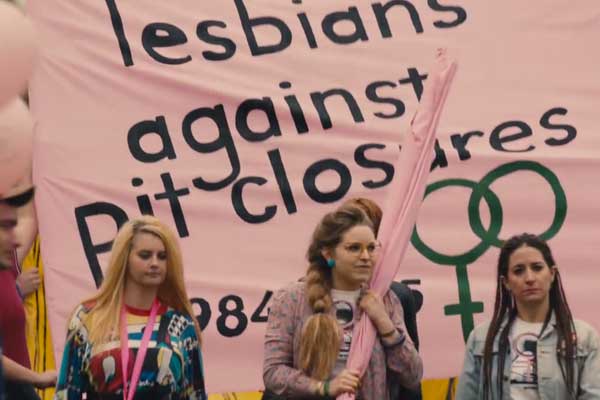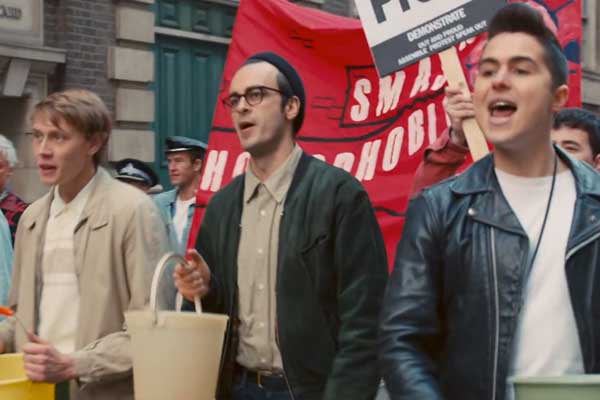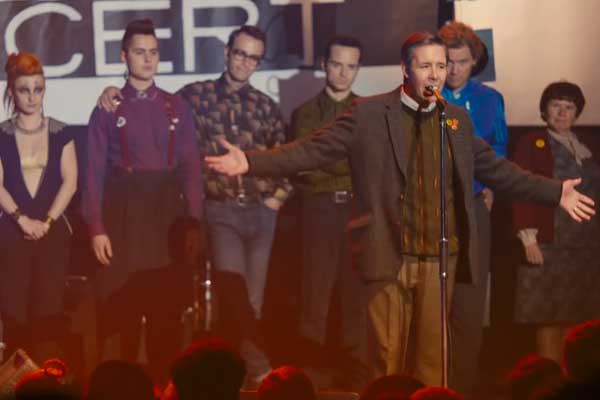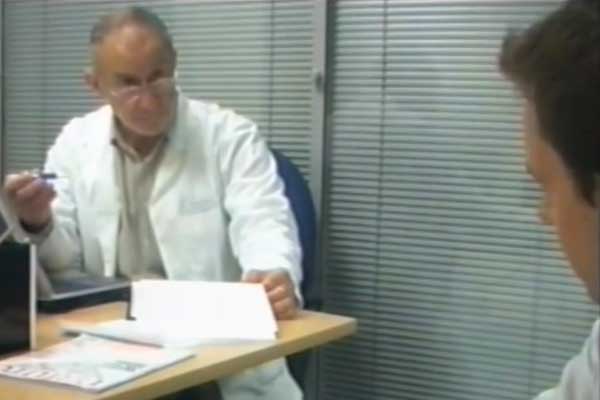I normally don’t like the kinds of movies that progressives and leftists rave about. Usually, when they, they’re boring and politically tame, like Good Night, and Good Luck. There are occasional exceptions, like the excellent Four Lions. Of course, a funny, intelligent and non-racist movie about Islamists terrorists wasn’t made in Hollywood, but the UK.
Anyway, when various radical leftists started gushing about Pride, I felt doubtful. When I saw its rave reviews, I thought I’d check it out. As it turns out, it actually is a really great movie. It has a warm heart, is funny, and is probably the only movie I’ve ever seen that has portrayed left-wing activism in a positive manner. Though it doesn’t have the Internationale, it is also full of left-wing songs (but a warning those who haven’t seen the movie – this article features spoilers. Though there are no major surprises or twists, so knowing how the story will turn out shouldn’t have too much of an effect on enjoyment of the movie).
The plot of the movie is relatively straightforward. The basic historical context is the massive strike in Britain led by National Union of Mineworkers in 1984, against the ultra-reactionary government of Prime Minister Margaret Thatcher. Pride tells the story of a group called Lesbians and Gays Support the Miners (LGSM).

Ultimately, the strike was unsuccessful. The miners were defeated, and went back to work about a year after the strike began. Yet the activism of LGSM was not entirely unsuccessful. As the movie notes at the end, various mining unions attended the 1985 gay pride march, and began to support gay and lesbian issues within the British Labour Party, playing a crucial role in improving the Labour Party’s stance on gay and lesbian rights.
The solidarity LGSM showed to the striking miners was returned by miners after the strike was over.
Politically, the message of the movie is clear: people uniting across issues like class and sexuality – showing solidarity with each other’s struggles – can achieve meaningful gains, even if there are temporary setbacks and seeming defeats. While the miners weren’t successful, but the organisation across disparate communities created valuable bonds of solidarity.
Though the movie is about activism and politics, it is overwhelmingly a light-hearted and entertaining movie, which sprinkles its politics across two hours with a light touch.
The leader of the gay activists is a young man called Mark Ashton. At a gay pride parade, he gets a bucket and starts collecting for the miners. Another activist asks him why.
“Who hates the miners?” he asked. “Thatcher. Who else? The police, the public and the tabloid press. That sound familiar?” The point wasn’t that their interests were the same. It was that their enemies were the same.
When Mark made his pitch for founding the LGSM at a gay bookstore, he again explained this point. He began by noting that the police hadn’t inflicted “much in the way of beatings or abuse… are the police getting soft? They’ve stopped hanging around outside our clubs lately. What’s that about? Do you think they finally got sick of all that Donna Summer? My guess is that they went somewhere else. To pick on someone else. My guess is that while we’re enjoying a temporary reprieve, they’re here (holding up a newspaper about police clashes with the miners) giving these poor sods the shit we usually get. Now these mining communities are being bullied just like we are. Right? Bullied by the police, bullied by the tabloids, bullied by the government.”
In some respects, the miners gaining a marginalised and stigmatised group as allies may well have harmed their cause. The unions declined to accept their money because, in the words of one LGSM activist, they wouldn’t want to be associated with “poofs”. The striking miners may have thought – reasonably enough – that their struggle was hard enough, without having to simultaneously take on the cause of supporting gay rights and opposing the stigmatisation of gay people and lesbians.
After LGSM failed to get a direct connection with unions, they instead managed to find a town in Wales willing to accept their support. The movie depicts the process of a group of gay activists trying to come to terms with – and build relationships with – miners from the north.
Comedy ensues as they try to build human connections, while bridging the suspicion the communities have for each other. One member of the real-life LGSM claimed that the movie Pride “exaggerated” the antagonism within the town for LGSM, explaining that the welcome they received even on their first visit was “astonishing”.

Even so, it is easy to forget the cultural changes that have occurred even in the last 20 years on the subject of homophobia.
I remember in primary school the open homophobia that was common among students I knew – students who would now overwhelmingly look back on such opinions with shame.
I remember arguing – and in my mind, it was an innovative argument – that homophobia was similar to racism, which everyone knew was bad.
There has been serious progress in the Western world on the issue of homophobia, which may make it hard to understand the dilemma of the miners in the 1980s.
Homophobia may well have seemed completely normal at the time, or at least was generally respectable enough. You can see video footage of one of Thatcher’s achievements after crushing the miners – she explained that children were being “cheated” by being taught that they had an “inalienable right to be gay”.
This was followed in 1988 by Section 28. This law prevented the “promotion” of homosexuality.
The result, as noted by Matthew Todd, was making “teachers feel they could not tell kids that if they were gay, it was OK.”
It wasn’t until that the latest leader of the Conservatives, David Cameron, apologised for Section 28.
What should the unions have done? In retrospect, it is easy to say that homophobia is wrong and they should have happily accepted solidarity from LGSM. As it happens, the tabloids printed a story exposing the connection, and the union responded by refusing to accept further support from LGSM.
Tactically, they were in a desperate situation. The issue of homophobia was by no means settled or uncontroversial, and it was likely that this was an alliance which would alienate some people who might otherwise be sympathetic to the miners, as well as make some miners themselves uneasy.
LGSM did not have to support the miners as LGSM. They could have donated anonymously, supporting the miners without raising the potentially divisive additional issue of miners being supported by gay people. They also could have focused on their own issues, and let the miners fight their own battle with whatever individual supporters from the gay and lesbian community they could find.
But the benefits of supporting the miners were longer term. Two communities with similar enemies united, forged bonds of solidarity, realised their common interests, and were placed in a stronger position to face future battles together.
However, solidarity doesn’t just have to be framed as a question of potential benefits. Instead, one might simply ask: are these causes worth supporting? For those who oppose homophobia and support social justice, embracing both causes simply flows from possessing certain principles.
If someone thinks these things flow from being left wing, or from their interpretation of Christianity, there is no need to seek out a relevant form of self-interest from such solidarity. All that is needed is a meaningful commitment to relevant values.
In the movie, the two groups weren’t necessarily entirely familiar with each other’s issues. The movie shows discomfort, and the gradual gaining of trust as the relationships among the communities develop.
They didn’t police each other’s language, or make demands about the correct way of being supportive. Two vulnerable groups, full of flawed human beings, did their best to unite and help each other out. It required kindness, and a bit of goodwill.
In a lovely scene early in the movie. Dai, representing the town in Wales, visits LGSM, and is taken aback to discover what L and G stand for. After asking the L and Gs he met with to convey his thanks, he was instead invited to a gay nightclub to convey his thanks personally.
After working the crowd, he continued: “What I'd really like to say to you tonight is thank you. If you're one of the people that's put money in these buckets, if you've supported LGSM, then thank you, because what you've given us is more than money. It's friendship. When you're in a battle against an enemy so much bigger, so much stronger than you, well, to find out you had a friend you never knew existed, well, that's the best feeling in the world.”

This speech resonated with me very deeply. Robert Manne once wrote, “My political identity is grounded in one simple, overwhelming fact – the decision taken by the Nazis to wipe the Jews from the face of the Earth.” Among Jews, this is probably a somewhat common phenomenon, though how we interpret the lessons of the Holocaust may differ.
A common feeling among many Jews is bitterness towards much of the world. Why didn’t they save us? Why did they let it happen? Why did the countries of the world shut the door to us in our hour of need, when we needed asylum?
My horror at the Holocaust was always visceral. Yet, from a young age, I was haunted by the question: how would I have behaved, if I had lived in Germany during those times as a non-Jew?
Certainly, I knew what answer was pleasant to believe. It was straightforward to say the Holocaust was bad and shouldn’t have happened, but it was more complex to figure out precisely what should have been done at which points.
Put another way: what would I have done differently? Nazi Germany was a totalitarian, authoritarian state. The media was filled with monolithic anti-Semitic propaganda, and people who criticised the government would be killed.
Could I be sure I would have been one of the good Germans?
Honest consideration of these questions necessarily leads to universalised understanding. As a child, one thing that made a strong impression on me was a workshop I attended on social psychology. Among other things, I learned about the Asch line experiments.
A participant would be invited to a group, unknowingly filled with actors. They would be asked which lines drawn on a piece of paper corresponded in length. The actors would all give inaccurate answers, and 75 percent of the time, the participant would conform with a blatantly wrong answer at least once.
However, even one fellow dissident (also played by an actor) who gave a dissenting view on the length of lines had a huge influence in reducing conformity.
Then there were Stanley Milgram’s experiments. Milgram would invite participants to shock a student (played by an actor) when the student gave a wrong answer. The shocks given were of increasing severity – yet most of the participants would administer extremely severe shocks to a screaming “student”, just because someone in a position of authority had told them to do so.

Though the seed had already been planted, I resolved that I wouldn’t say two lines matched just because everyone around me did. I wouldn’t be the kind of person who would electrocute someone else just because someone with a clipboard and white coat told me to. And if the time or need came, I would stand in solidarity with the next Jews to face oppression and persecution.
That was at least the person I hoped to become.
Whilst many in the Jewish community feel bitter towards those who turned away during our hour of need, we honour the Righteous Gentiles. The most famous is Oskar Schindler, on account of the Spielberg movie, but there were others too, who risked their lives to save Jews during the Holocaust.
It’s not just the Righteous Gentiles who are worthy of being honoured. There are others of unimaginable courage and principle who stood in solidarity with the Jews. The White Rose were a group of students and a professor in Nazi Germany, who issued six defiant leaflets opposing the Nazis, proudly declaring that “We will not be silent”. The Nazis caught and murdered all of them.
In Owen Jones’ review of Pride, he argued that “The basis of solidarity is this: you have common interests and a common enemy that eclipse your differences, and you strengthen your hand by uniting and using your collective strength.” Yet the members of the White Rose didn’t have “common interests”, except in the most abstract sense. They could have ignored that Jews were being “murdered in the most bestial manner”, and gotten on with their lives.
Similarly, the miners and the gay community didn’t really have common interests, until they decided to support each other. Even so, in that instance, there were two reasonably large and cohesive communities.
Sometimes, communities will be small, isolated and riven with divisions. Solidarity in such circumstances might not be a wise tactic. Yet it still may be the right thing to do.
Donate To New Matilda
New Matilda is a small, independent media outlet. We survive through reader contributions, and never losing a lawsuit. If you got something from this article, giving something back helps us to continue speaking truth to power. Every little bit counts.



